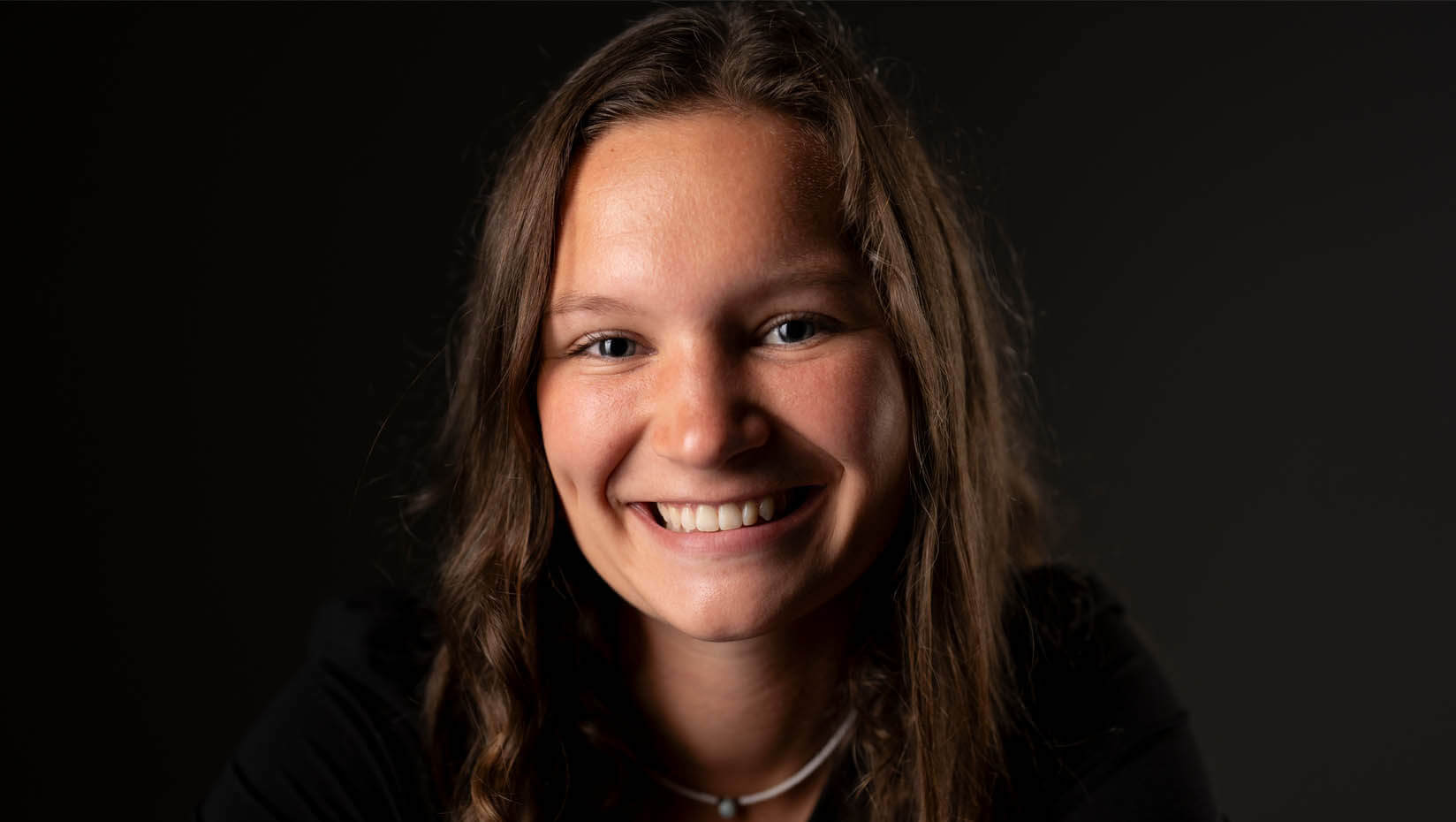
Molly Hale: A scientific approach to preventing childhood brain injury
Molly Hale is using pediatric medical data to learn how brain injuries in children can be anticipated and prevented. The senior at the University of Maine was given a grant by the Center for Undergraduate Research (CUGR) to compare national data sets to find the connection between adverse experiences and brain injuries in children 12 years old and younger.
The communication sciences and disorders major grew up in Cumberland, Maine, where she attended Greely High School. While in high school, Hale won a scholarship to UMaine in the Maine State Science Fair in the category of Behavioral Sciences – Cognitive Psychology for a research project comparing reading comprehension in written versus digital texts, and became a Maine Top Scholar.
Hale’s love for psychology research continued into her college days, where she decided to major in communication sciences and disorders. She met Jessica Riccardi, assistant professor at the department of communication sciences and disorders, through another one of her professors who suggested Hale would enjoy work in Riccardi’s Brain Injury, Education, and Rehabilitation (BEAR) lab.
“She’s lovely and wicked smart. We’ll just be talking and she’ll be able to spit out all these facts,” says Hale of Riccardi. “She gives me direct, specific, understandable tasks to do and she’s good at offering guidance.”
In the lab, Hale looks at the connection between child brain injuries and adverse experiences, which can include the incarceration of a parent, witnessing death or violence, having parents divorce, experiencing neglect, or being abused. Her research provides an important step toward understanding and preventing brain injury in children, which can have lifelong consequences on their temperament and learning abilities.
“The most surprising part has been the lack of research around brain injuries. If you think about all the different parts of the brain, a brain injury is so dependent on what part of the brain is impacted, people are gonna experience different symptoms,” says Hale. “There’s not a lot of research around how to recover from a brain injury, or how people are affected down the road.”
Hale gets the data for her project from an existing national dataset on various health-related outcomes and experiences, including brain injuries and adverse childhood experiences, in children ages one to 18 collected by primary care physicians. Hale parses out the variables related to her project, namely number of incidents of adverse experiences and incidents of brain injury, for the age group one to 12. She hopes to show what adverse experiences most often lead children to engage in risky behaviors that lead to brain injury, in order to inform doctors on how to recognize and prevent such incidents.
“Molly independently sought out research experiences to diversify her knowledge and skills. She is a natural question-asker and problem solver. Her strengths and her varied interests in health and education disciplines made her a great fit for this project,” says Riccardi. “Molly dove head first into a large data set of over 12,000 children and has continued to ask great questions and independently work through some data challenges. She’s been a pleasure to work with and I look forward to seeing her upcoming presentations and publications on this project!”
Their research will be completed by September; Hale and Riccardi plan to attend the Association for Speech and Hearing (ASHA) Convention in Boston, Massachusetts, in November to present their findings.
“I’m excited to go and see other projects and learn what other people do, what other options are out there,“ says Hale. “That’s the definition of lifelong learning, right? Not everything is done in school.”
Outside of research at UMaine, Hale is the president and captain of the women’s ultimate Frisbee team. This summer, while working on her research project, Hale has also worked in an ophthalmology office as an eye technician to see how she likes working in a medical environment.
“I’ve been trying to get exposed to some health care experience to see if that’s something I really want to do,” says Hale. “I really enjoy the patient interaction.”
After completing her senior year, Hale plans to take some time off to work and narrow down her field of interest before eventually going to graduate school. She would like to end up in a field related to neurology, where she can also continue to work with children. She is already looking into some research positions she could take on after graduation.
This story was written by Erin Cabral, 2023 Summer Intern at the UMaine Division of Marketing at Communications.
Contact: Sam Schipani, samantha.schipani@maine.edu
